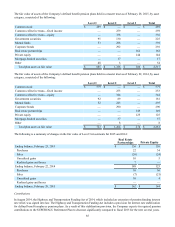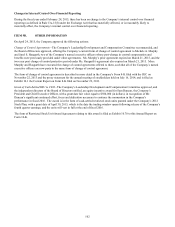Albertsons 2015 Annual Report Download - page 95
Download and view the complete annual report
Please find page 95 of the 2015 Albertsons annual report below. You can navigate through the pages in the report by either clicking on the pages listed below, or by using the keyword search tool below to find specific information within the annual report.93
contributions to the SUPERVALU Retirement Plan in excess of the minimum required contributions at or before the end of
fiscal years 2015 – 2017 and AB Acquisition had agreed to provide a guarantee to the PBGC for such excess payments. On
September 11, 2014, the Company, AB Acquisition and the PBGC amended the term sheet. Pursuant to that amendment, the
Company made excess contributions of $47 to the SUPERVALU Retirement Plan and the Company is no longer restricted by
the term sheet from paying dividends to its stockholders and has fully satisfied its obligations to make excess contributions to
the SUPERVALU Retirement Plan. While the Company is no longer restricted from paying dividends to its stockholders under
the term sheet, the Company has no current intent to resume paying dividends. The payment of future dividends is subject to
the discretion of the Company’s Board of Directors and the requirements of Delaware law, and will depend on a variety of
factors that the Company’s Board of Directors may deem relevant. In addition, as described above in Note 7—Long-Term
Debt, the Company is limited in the aggregate amount of dividends that the Company may pay during the term of its Secured
Term Loan Facility and would need to meet certain conditions in the Secured Term Loan Facility and the Revolving ABL
Credit Facility before paying a dividend.
During fiscal 2015, the Company recognized $69 of discrete tax benefits attributable to discontinued operations (see Note 16—
Discontinued Operations), which relates to tangible property repair regulations. The Company believes it is entitled to these tax
benefits, but is in discussions with NAI and Albertson’s LLC on whether the Company will pay any portion of the related tax
refund to NAI and Albertson’s LLC.
Legal Proceedings
The Company is subject to various lawsuits, claims and other legal matters that arise in the ordinary course of conducting
business. In the opinion of management, based upon currently-available facts, it is remote that the ultimate outcome of any
lawsuits, claims and other proceedings will have a material adverse effect on the overall results of the Company’s operations,
its cash flows or its financial position.
In September 2008, a class action complaint was filed against the Company, as well as International Outsourcing Services, LLC
(“IOS”); Inmar, Inc.; Carolina Manufacturer’s Services, Inc.; Carolina Coupon Clearing, Inc. and Carolina Services in the
United States District Court in the Eastern District of Wisconsin. The plaintiffs in the case are a consumer goods manufacturer,
a grocery co-operative and a retailer marketing services company that allege on behalf of a purported class that the Company
and the other defendants (i) conspired to restrict the markets for coupon processing services under the Sherman Act and
(ii) were part of an illegal enterprise to defraud the plaintiffs under the Federal Racketeer Influenced and Corrupt Organizations
Act. The plaintiffs seek monetary damages, attorneys’ fees and injunctive relief. The Company intends to vigorously defend
this lawsuit; however, all proceedings have been stayed in the case pending the result of the criminal prosecution of certain
former officers of IOS.
In December 2008, a class action complaint was filed in the United States District Court for the Western District of Wisconsin
against the Company alleging that a 2003 transaction between the Company and C&S Wholesale Grocers, Inc. (“C&S”) was a
conspiracy to restrain trade and allocate markets. In the 2003 transaction, the Company purchased certain assets of the Fleming
Corporation as part of Fleming Corporation’s bankruptcy proceedings and sold certain assets of the Company to C&S that were
located in New England. Since December 2008, three other retailers have filed similar complaints in other jurisdictions. The
cases have been consolidated and are proceeding in the United States District Court for the District of Minnesota. The
complaints allege that the conspiracy was concealed and continued through the use of non-compete and non-solicitation
agreements and the closing down of the distribution facilities that the Company and C&S purchased from each other. Plaintiffs
are seeking monetary damages, injunctive relief and attorneys’ fees. On July 5, 2011, the District Court granted the Company’s
Motion to Compel Arbitration for those plaintiffs with arbitration agreements and plaintiffs appealed. On July 16, 2012, the
District Court denied plaintiffs’ Motion for Class Certification, and on January 11, 2013, the District Court granted the
Company’s Motion for Summary Judgment and dismissed the case regarding the non-arbitration plaintiffs. Plaintiffs have
appealed these decisions. On February 12, 2013, the 8th Circuit reversed the District Court decision requiring plaintiffs with
arbitration agreements to arbitrate and the Company filed a Petition with the 8th Circuit for an En Banc Rehearing. On June 7,
2013, the 8th Circuit denied the Petition for Rehearing and remanded the case to the District Court. On October 30, 2013, the
parties attended a District Court ordered mandatory mediation, which was not successful in resolving the matter. On May 21,
2014, a panel of the 8th Circuit (1) reversed the District Court’s decision granting summary judgment in favor of the Company
and (2) affirmed the District Court’s decision denying class certification of a class consisting of all retailers located in the States
of Illinois, Indiana, Iowa, Michigan, Minnesota, Ohio and Wisconsin that purchased wholesale grocery products from the
Company between December 31, 2004 and September 13, 2008, but remanded the case for the District Court to consider
whether to certify a narrower class of purchasers supplied from the Company’s Champaign, Illinois distribution center and
potentially other distribution centers. On August 19, 2014, the 8th Circuit denied the Company’s petition for en banc review by
the 8th Circuit on the reversal of the summary judgment decision and specific issues raised thereunder. The case is now
remanded to the District Court for further proceedings to be determined by the District Court. On January 16, 2015, the
























